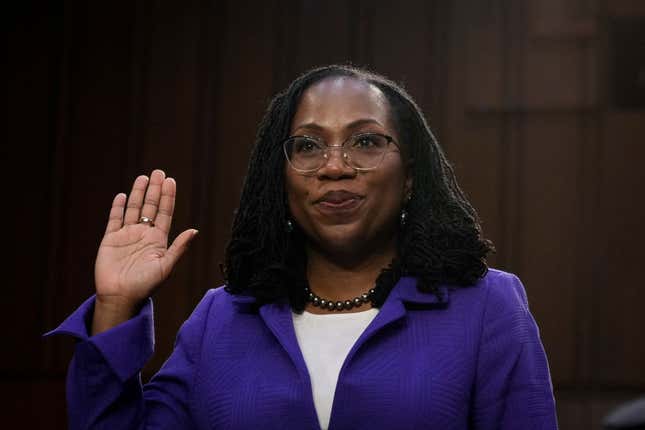
The Root previously reported that there were calls for Justice Ketanji Brown Jackson to recuse herself in an upcoming affirmative action case involving Harvard University. Jackson was a Harvard’s Board of Overseers, who advised policy matters from 2016 until the Spring. Although Jackson said she would recuse herself, the Supreme Court devised a way for the Justice to participate, NBC News reports.
A new brief states that later this fall, the high court will separate Harvard and University of North Carolina cases. Jackson will be able to rule regarding the North Carolina lawsuit. Students for Fair Admission, an anti-affirmative action group, had petitioned the Supreme Court to combine cases involving Harvard and the University of North Carolina. The court agreed to combine the cases into one hearing in January, but Jackson’s appointment changed that.
From NBC News:
Federal law requires all judges to recuse from cases in which their “impartiality might reasonably be questioned,” including close ties to a party, a financial interest in the outcome or participation at an earlier stage of the case.
Harvard is a private university, while UNC is a public one. Even though Jackson can vote in one of these cases, it may hardly make a dent in a 6-3 conservative majority Supreme Court body. As the cases will most likely be heard in late November, there’s a potential that affirmative action practices could be banned from college admissions hurting primarily students of color.
The SFFA sued Harvard in 2014, alleging schools discriminate against Asian-American applicants and violate federal law by considering race in their admissions processes. The group also sued Yale University and the University of Texas at Austin. Harvard and the University of North Carolina denied wrongdoing and stated, “they should be able to consider race as a factor in admissions to diversify their classes.”
“The Supreme Court decision to review the unanimous decisions of the lower federal courts puts at risk 40 years of legal precedent granting colleges and universities the freedom and flexibility to create diverse campus communities,” Harvard President Lawrence Bacow said in a statement.

